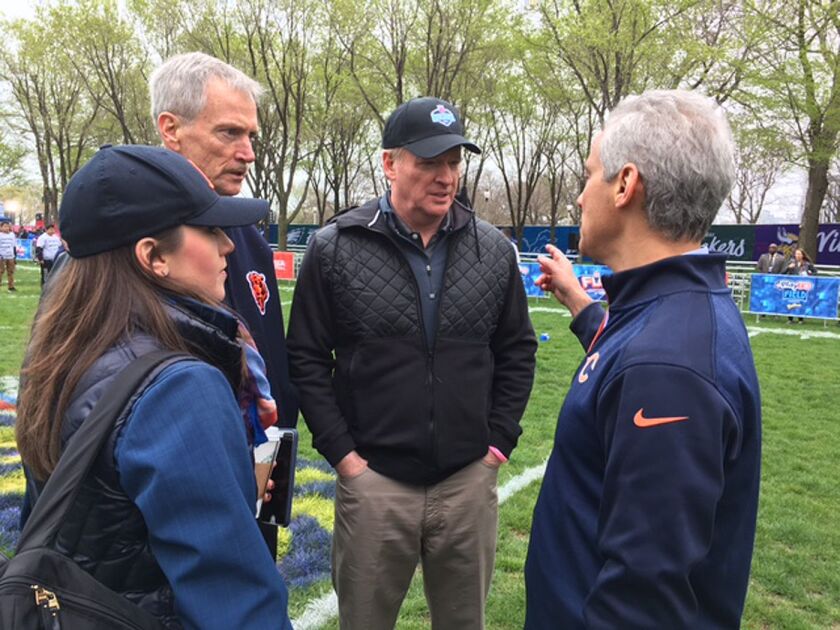Bears President George McCaskey vowed Wednesday to “tastefully” execute a dramatic influx of stadium advertising at Soldier Field and opened the door to using some of the money to build “bunker suites” that allow high rollers to watch games at ground level.
Soldier Field has 133 luxury suites at varying above-ground levels, all of them located on the east side of the stadium facing the Chicago skyline.
The concept of adding suites at ground level was pioneered by the Seattle Seahawks and promptly duplicated by a handful of other teams.
Last fall, the Chicago Sun-Times lifted the veil on the Bears’ decision to join the parade of NFL teams eyeing bunker suites.
On Wednesday, McCaskey talked up the concept before joining Mayor Rahm Emanuel and NFL Commissioner Roger Goodell at a “Play 60” football clinic for kids in Grant Park on the eve of the 2016 NFL Draft.
“That’s a possibility. One of many possibilities. I don’t know what the number is, but people seem to enjoy that experience. Having different ways to view the game is important,” McCaskey said.
“A number of stadiums have ’em now. . . . It isn’t the best view of the game, but people don’t seem to mind. The proximity is a big selling point.”
The door to, what’s expected to be a dramatic influx in stadium advertising was opened by Emanuel’s now-scrapped plan to give movie mogul George Lucas 17 acres of land near Soldier Field to build his interactive museum.
In exchange for the inconvenience of losing the South Parking Lot to Lucas, the Bears bargained hard for a host of marketing and advertising opportunities that could go a long way toward financing stadium upgrades.
They range from selling “sponsorship and entitlement rights” to Soldier Field gates, the stadium’s ticket office and will-call building to the northeast mezzanine area, southeast lawn and Stadium Green.
Also on the list of marketing and naming rights opportunities are the North and Mid-South parking garages, “including, but not limited to strong branding on light poles, entry gates, passes, etc.”
In addition, the Bears won the right to install 30 “high-impact, interactive digital displays throughout Soldier Field concourse and premium areas” with locations “not limited to the main concourse, grandstand, media deck, Gate 14 entry, club and suite levels.”
Underscoring Emanuel’s contention that Bears brass were “very tough negotiators,” the team’s amended lease includes the right to sell “entitlement and/or sponsorships rights to any additional and/or future re-design improvements or enhancements to Soldier Field” contemplated by a study conducted by Populous, a Kansas City-based stadium architect.
The capital projects were viewed as so essential, the marketing agreement will live on, whether or not the Lucas Museum ever gets built — either on the South Parking Lot or on the site of what is now McCormick Place East.
That feasibility study has been going on for a year and has already identified $300 million in “potential capital improvements” to the lakefront stadium.
Projects range from concourse, field and drainage improvements to adding bunker suites and 5,000 seats to bolster Emanuel’s long-shot bid to host the Super Bowl and, more importantly, to increase seating capacity for other revenue-generating events.
“That’s the whole idea: To do it tastefully but to maximize the revenues to improve the building. . . . I don’t know about the scope of the signage project, but all of those dollars are committed to going back into the building to enhance the fan’s game day experience,” McCaskey said Wednesday.
“We . . . hired a firm to do a feasibility study. It’s got all sorts of ideas about how to do it. We just want to make sure that the money is prudently spent . . . on the best things possible. We got the new video boards last year. Those have been very popular and I think have really enhanced the game day experience. That’s kind of thing we’re looking for.”
McCaskey said expanding Soldier Field’s seating capacity is “something that’s been looked at from time to time,” but “the last I heard is that the return on investment wouldn’t be there.”
Bunker suites have become popular in the NFL — not because they offer a great view of the game, but because they provide a unique, intimate look at the game and the players.
Fans in such suites can’t look down on what what’s going on the field the way those in most other seats can. But they feel like they’re in the middle of the action. They hear shoulder pads clash and players grunt. They can almost smell their sweat. Fans like that kind of intimate social setting, even if they can’t watch the game.
If bunker suites are limited to the end zones at Soldier Field, there would likely be room for a few dozen.
On the sidelines, the Bears are more likely to follow the lead of the Cowboys and Giants by creating field-level clubs with private rooms without a view of the game and access to already-existing nearby seats from which to watch the game. Since many of the seats are already assigned to individuals, the seats linked to sideline bunker suites may not be next to each other.
Last week, Chicago Park District Supt. Mike Kelly told the Sun-Times he expects to know within two weeks precisely how many signs the Bears intend to add at Soldier Field, along with the locations of that advertising.






